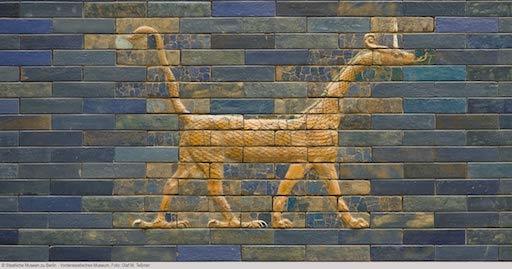The Babylon Project
The Babylon Project – full name The Babylon Collection of the Vorderasiatisches Museum Berlin: A methodological and epistemological study of collection-based research in Museums (06/2016-04/2020) – is set up as a pilot project. Its objective is to systematically catalogue the thousands of objects and archival documents from and about Babylon, processing them for future scholarly research and organising them within the collection.
As part of an innovative research project funded by the German Research Foundation (DFG), researchers from the Vorderasiatisches Museum of the Staatliche Museen zu Berlin and the Institute of Ancient Near Eastern Studies at the Freie Universität Berlin are currently subjecting the Babylon holdings of the Vorderasiatisches Museum to systematic analysis. The Deutsche Orient-Gesellschaft Berlin will also be supporting the project as a cooperation partner.

The Babylon Project – full name The Babylon Collection of the Vorderasiatisches Museum Berlin: A methodological and epistemological study of collection-based research in Museums (06/2016-04/2020) – is set up as a pilot project. Its objective is to systematically catalogue the thousands of objects and archival documents from and about Babylon, processing them for future scholarly research and organising them within the collection.
As part of an innovative research project funded by the German Research Foundation (DFG), researchers from the Vorderasiatisches Museum of the Staatliche Museen zu Berlin and the Institute of Ancient Near Eastern Studies at the Freie Universität Berlin are currently subjecting the Babylon holdings of the Vorderasiatisches Museum to systematic analysis. The Deutsche Orient-Gesellschaft Berlin will also be supporting the project as a cooperation partner.
The objects in the Berlin Baylon holdings were unearthed between 1899 and 1917 in the course of archaeological excavations overseen by Robert Koldewey. As a result of the agreements on the division of the finds, the objects have been located in Berlin since 1927. According to recent findings by the Babylon Project, the excavation in Babylon uncovered a total of some 77,500 objects spanning three millennia, including clay tablets inscribed with cuneiform script, everyday ceramics and jewellery. Of these, some 30,000 are today housed in the Vorderasiatisches Museum.
Furthermore, a significant portion of the excavation and inventory documentation has been preserved, including diaries, photographs, packing lists, cards, partial estates of people involved in the excavations, and architectural plans. These are also stored in the Vorderasiatisches Museum, with a large portion in the Staatliche Museen zu Berlin’s Zentralarchiv and some in the archive of the Deutsche Orient-Gesellschaft. The documentation comprises some 8,000 individual archive items.
At the current rate (as of summer 2018), by the end of the project, some 15,000 of the almost 30,000 archaeological objects located in Berlin along with the excavation and collection documentation associated with them will have been examined by the research team, correlated with their find context and systematised. In the process, the object histories of the artefacts will also be investigated, from their production through to their current site of preservation in the Vorderasiatisches Museum. Smaller case studies on typical find structures and trialling of the possibilities for presenting research in the museum context will round off the project. The project aims to generate the scholarly basis for long-term and internationally networked research projects on the cultural history of ancient Babylon on the one hand, and on the other, make use of the material to analyse and enhance fundamental, collection-specific research in museums.
The Babylon Project is led jointly by Markus Hilgert (Director of the Vorderasiatisches Museum Berlin up until 4/2018), Lutz Martin (Acting Director of the Vorderasiatisches Museum Berlin, since 5/2018), Eva Cancik-Kirschbaum (Professor for Ancient Near Eastern Studies, Freie Universität Berlin) and Joachim Marzahn (Honorary Professor for Ancient Near Eastern Studies, Freie Universität Berlin; Deputy Chair of the Deutsche Orient-Gesellschaft)
The Babylon Project is supported by the German Research Foundation.
Detailed information on the project is available on the project website.
.